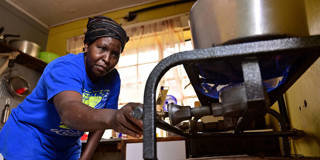The kerosene and charcoal used for cooking in much of Sub-Saharan Africa limits the continent’s ability to meet its climate goals and damages the health of millions of women and children. Cleaner alternatives would mitigate these problems and create urgently needed jobs for the region’s rapidly expanding population.
NAIROBI – As the world races to meet the goal of net-zero carbon emissions, most regions are focusing on the energy sector. But in Sub-Saharan Africa, cooking fuel poses a bigger challenge. If Africa is to achieve its emissions-reduction goals, Africans must find a clean, affordable way to prepare food.
More than 80% of people in Sub-Saharan Africa use charcoal, kerosene, or firewood to cook. These fuels produce black carbon, one of the biggest contributors to climate change after carbon dioxide.
And they do more than harm the planet. The household pollution caused by traditional cooking fuels contributes to more than 500,000 premature deaths annually in the region. It also leads to stunted growth and increased risk of respiratory infections in children under five. And, with Sub-Saharan Africa’s population growing 2.7% annually, the problems associated with cooking fuel will worsen until a safer, cleaner option is found.

NAIROBI – As the world races to meet the goal of net-zero carbon emissions, most regions are focusing on the energy sector. But in Sub-Saharan Africa, cooking fuel poses a bigger challenge. If Africa is to achieve its emissions-reduction goals, Africans must find a clean, affordable way to prepare food.
More than 80% of people in Sub-Saharan Africa use charcoal, kerosene, or firewood to cook. These fuels produce black carbon, one of the biggest contributors to climate change after carbon dioxide.
And they do more than harm the planet. The household pollution caused by traditional cooking fuels contributes to more than 500,000 premature deaths annually in the region. It also leads to stunted growth and increased risk of respiratory infections in children under five. And, with Sub-Saharan Africa’s population growing 2.7% annually, the problems associated with cooking fuel will worsen until a safer, cleaner option is found.